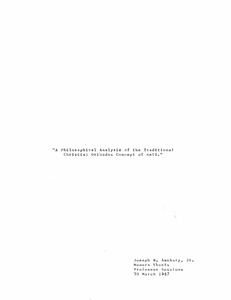| dc.rights.license | In Copyright | en_US |
| dc.creator | Amsbary, Joseph Byrd | |
| dc.date.accessioned | 2023-01-23T18:29:42Z | |
| dc.date.available | 2023-01-23T18:29:42Z | |
| dc.date.created | 1987 | |
| dc.identifier | WLURG38_Amsbary_thesis_1987 | |
| dc.identifier.uri | https://dspace.wlu.edu/handle/11021/36063 | |
| dc.description.abstract | This thesis opens with the distinction between two models of hell -- the so-called static and dynamic. The static model asserts that damned individuals are punished only tor their sins accumulated during their temporal lives; that is, free will does not exist after death, and those in hell are retributively punished tor eternity. The dynamic model, on the other hand, allows tor the existence of free will after death. The damned are punished, or rewarded for their actions before and after death. In the second section of the thesis, I examined punishment -- both retributive and utilitarian theories. We saw that, although there existed a "collective moral intuition " which defended the retributive punishment of the offender -- that is, the retributive theory may expose "who" to punish, and even provide a ceiling as to the amount of punishment -- it does not account tor the results of the punitive actions. The utilitarian theory offers little to our discussion, although it demonstrates the need for punishment to account for its consequences. John Rawls offers a solution to this problem by stating that an offender can be retributively punished tor a deed, but the activity, or institution of punishment exists with a higher end in mind, such as the reformation of the offender. Section three concludes with an attempt to reconcile punishment and the two previously noted concepts of hell. The static model was found to appear tantamount to revenge, as it thoroughly ignored the lextalionis by instituting a punishment that did not fit the crime. The dynamic model was found to be the most morally justifiable of the two. [From introductory section] | en_US |
| dc.format.extent | 44 pages | en_US |
| dc.language.iso | en_US | en_US |
| dc.rights | This material is made available for use in research, teaching, and private study, pursuant to U.S. Copyright law. The user assumes full responsibility for any use of the materials, including but not limited to, infringement of copyright and publication rights of reproduced materials. Any materials used should be fully credited with the source. | en_US |
| dc.rights.uri | http://rightsstatements.org/vocab/InC/1.0/ | en_US |
| dc.subject.other | Washington and Lee University -- Honors in Philosophy | en_US |
| dc.title | A Philosophical Analysis of the Traditional Christian Orthodox Concept of Hell | en_US |
| dc.type | Text | en_US |
| dcterms.isPartOf | RG38 - Student Papers | en_US |
| dc.rights.holder | Amsbary, Joseph Byrd | en_US |
| dc.subject.fast | Hell -- Christianity | en_US |
| dc.subject.fast | Damned | en_US |
| local.department | Philosophy | en_US |
| local.scholarshiptype | Honors Thesis | en_US |
